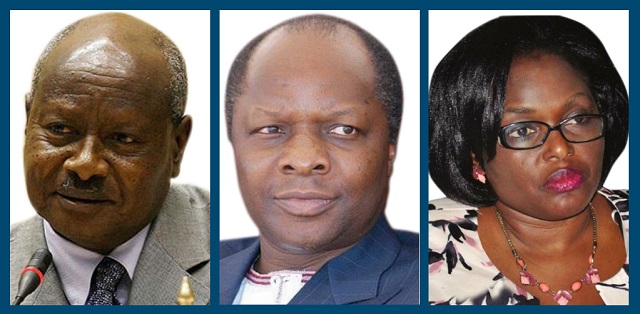
“Land is the foundation of life and life is more than money,” Okello told The Independent. “Land also is about the culture of the people; that is why it stirs a lot of sentiment among Ugandans.”
Okello doubts Museveni’s recent public castigation of Mailo land will solve the land question in Uganda? He says it is disingenuous of Museveni to imply that land conflict is more prevalent in Buganda.
“The tension over land is not only in Buganda, it is everywhere; it is in families and communities,” he told The Independent. But even if it was true that the conflict over land is more in Buganda, that too needs context, he says.
Okello describes how Gilbert Olanya (MP, Kilak County) and his people talk hysterically about Apaa land in the Acholi region; he talks of land conflicts in the Mt. Elgon region; he mentions conflicts over land in swamps, forests, and whole communities in Karamoja in northeastern Uganda.
“Complaints about land cut across the country,” he says, “It is not just mailo land; mailo land is just a new one.”
Dr. Livingstone Sewanyana, the executive director of the Foundation for Human Rights Initiative (FHRI) also thinks that President Museveni has never been genuine about Uganda’s land question.
“The mailo issue is no longer about Buganda. It is his people (people in government). They are buying land from Buganda; they are buying mailo land.
“So who is not adhering to the laws and policies of land acquisition in this country? The very people in his system are the ones evicting people and he has failed to tame them.
According to Sewanyana, the land tenure systems in this country spell out the relationships between landowners and tenants but problems arise out of the growing impunity among government officials who arbitrarily abuse these laws and policies.
According to Sewanyana, the land question was sorted out by the 1995 Constitution.
“But President Museveni has never taken seriously the Constitution,” he says.
“I also think the Justice Bamugemereire report was uncalled for,” he adds.
Sewanyana was referring to the report compiled from the Justice Catherine Bamugemereire’s Commission of Inquiry into Uganda’s land matters handed to President Museveni on July 29 last year.
Museveni appointed the seven-member Land Probe Committee on Dec.08, 2016 to investigate the effectiveness of the law, policies and processes of land acquisition, management and registration around the country.
The commission traversed 123 districts, heard 8,528 complaints, and spent about Shs20 billion. It recorded issues related to landlord-tenant relationships, land grabbing, double titling, encroachment on gazetted or protected areas (forest reserves and wetlands), abuse of office by public officials in land registration and land management processes, mismanagement of land by government entities, illegal acquisition of land by foreigners, tax avoidance in land acquisition, ignorance of the land law, and impunity in forced land acquisitions.
Tumushabe told The Independent that he never thought the Bamugemereire land probe would amount to anything.
“It was another diversion from President Museveni,” he says
But other commentators, like Cissy Kagaba, the executive director of the Anti-Corruption Coalition-Uganda, an anti-graft civil society organisation based in Kampala, says she would rather Museveni bases his sentiments on land on the recommendations in Bamugemereire’s Report.
“If you spend a lot of money and time on this land probe commission and then just shelve the report, it leaves a lot to be desired,” she says.
She says the mailo land tenure system “is both a political and cultural issue.” Kagaba has many queries: Upon which basis is Museveni saying the mailo land system is evil? Is it one of the recommendations that came out of Justice Catherine Bamugemereire’s land probe? Why is this report not being considered in its entirety?Where is mailo more predominant? What is the current relationship between President Museveni and Buganda?
Bamugemereire’s probe into land matters
For almost 30 months, the National Records Centre and Archives Complex on Plot 8-10, Lourdel Road in Wandegeya, Kampala, became a beehive of activity as the Commission welcomed complaints from mostly hapless peasants.
Often times, poor ordinary folk meekly faced-off with big names from powerful offices like ministers, officials from the president’s office, the police, the UPDF and other security organisations.
As she handed over her report to the president, Bamugemereire described the land disputes across the country as a “pandemic” where mostly well-to-do persons have obtained land through illegal means, bribing their way through all systems of land administration and registration.
“The land question in Uganda remains unanswered,” she told Museveni.
Bamugemereire hinted on a few of her recommendations as she handed over the voluminous report to President Museveni. She recommended establishment of an institutional framework for administration of customary land within a new framework known as the Uganda Land Services Bureau, land and environmental courts, reinstatement of district land tribunals, and establishment of a land Ombudsman in charge of civil and criminal investigative, prosecutorial and justice institutions to address land matters.
She also recommended enactment of distinct laws on wetlands and curtailment of the powers of the Chief Government Valuer and the Commissioner for land registration.
On land with minerals, the commission recommended checks to ensure only reputable companies get rights. It proposed a tax on idle land, and a national land bank to operate under the Uganda Lands Services Bureau (ULSB) to acquire land prior to and in accordance to the development agenda submitted to the National Planning Authority.
Bamugemereire said she was confident that Museveni would ensure the recommendations are implemented.
At the time, Museveni said the report would be presented to Cabinet. But nothing has been heard of it since.
 The Independent Uganda: You get the Truth we Pay the Price
The Independent Uganda: You get the Truth we Pay the Price


